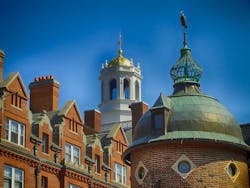According to a report by WGBH, the city of Cambridge, Mass., has been mixing some of the food scraps pulled from its Curbside Composting program with sewage sludge at the Greater Lawrence Sanitary District wastewater treatment plant in North Andover, Mass.
Food material gathered in compost receptacles are being mixed with primary solids and waste activated sludges that are put through an anaerobic digestion process, reducing the mass of the material and producing methane gas as a result.
However, despite what could be considered a positive use of the food waste, some residents feel the city is being dishonest as it is not composting the food waste. The final product of the waste is converted to fertilizer as the solid material dried out and broken down into pellets. Certain citizens are conflicted on this process.
“The city of Cambridge is doing the right thing by taking food scraps out of the landfill,” said Laura Orlando, a teacher of environmental health at Boston University. “It’s doing the wrong thing by adding those food scraps to a material that is known to be toxic.”
Counter to the claims of toxicity, Michael Orr, recycling director for the city of Cambridge, claims that any contamination present in the fertilizer produced using the food waste is well below all official limits or regulations. Whether or not the program will be altered or abandoned by residents as a result of the backlash remains to be seen, but the program has reduced the city’s trash by 10% since its implementation.
